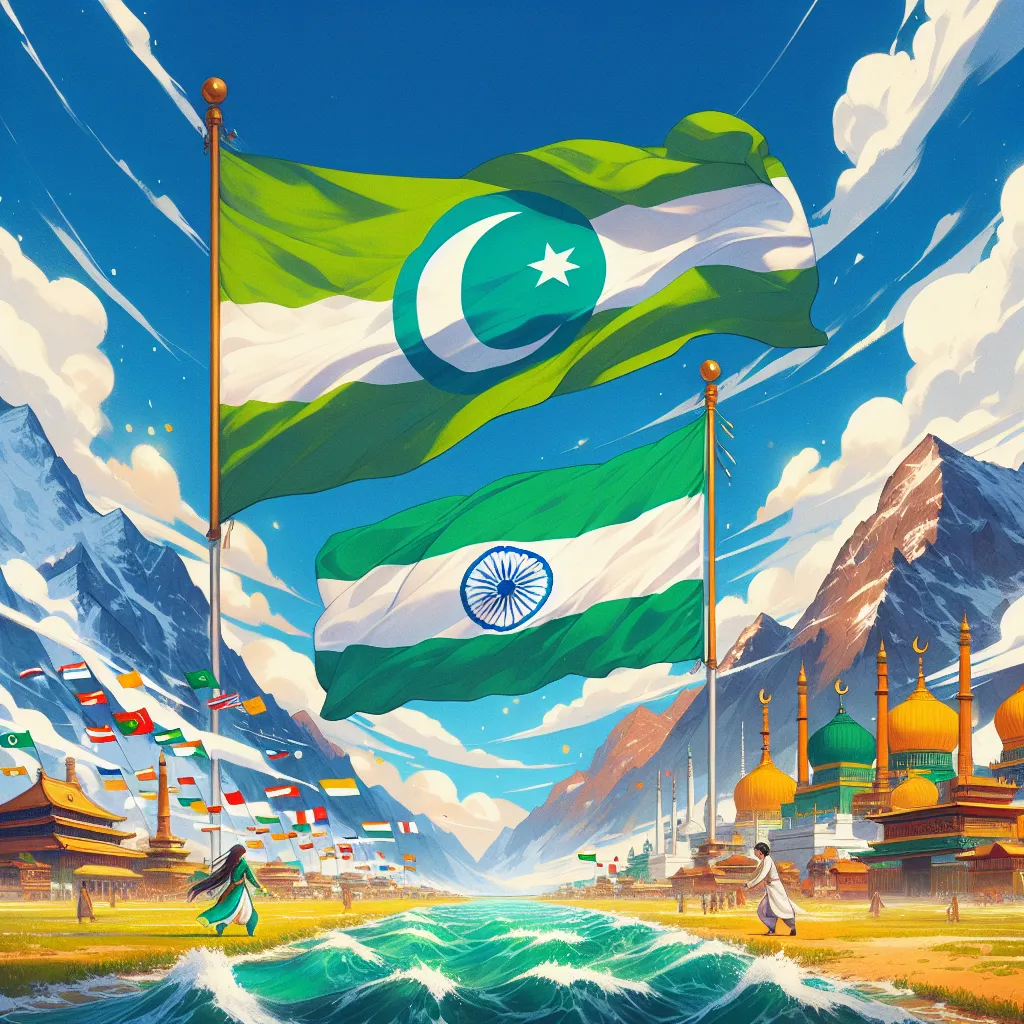Will India and Pakistan Go to War? Historical Context and Future Implications
Introduction
The question “will india and pakistan go to war” remains a perennial concern in South Asia, shaped by a rivalry rooted in the 1947 partition. This division birthed two separate nations, India and Pakistan, from British India, with lingering territorial disputes fueling ongoing tensions. The Kashmir region, a major point of contention, has been at the heart of the conflict since independence, leading to several confrontations.
Recent developments have heightened the relevance of this query, particularly the skirmishes across the Line of Control in Kashmir. These have raised concerns globally about a potential escalation. In the age of nuclear capabilities, the question “can pakistan defeat india in war” gains added complexity, as both nations possess significant military capabilities.
Understanding the historical context is crucial for grasping current dynamics. The “pakistan vs india war history” encapsulates multiple conflicts, with the “india-pakistan war list and result” providing insights into past outcomes. The “india-pakistan war 2019” further exemplifies ongoing tensions.
By examining the “india-pakistan war soldiers associated,” we glean the human costs and sacrifices that underscore these repeated clashes. The “india pakistan war list in hindi” offers a localized perspective, underscoring the depth of the rivalry inherent in their shared history.
Will India and Pakistan Go to War?Historical Background of India-Pakistan Relations
India and Pakistan’s tumultuous relationship began with the partition in 1947. This event divided British India, creating two independent dominions. Religious tensions and mass migrations marked this period, leading to significant unrest. The newly formed nations grappled with identity and territorial disputes.
Key conflicts have shaped their history: the Indo-Pak wars of 1947-48, 1965, 1971, and 1999. The first war erupted over Kashmir, a contentious region. Subsequent wars reflected escalating tensions and differing national interests. Each conflict left deep scars and further entrenched animosities.
Kashmir remains a flashpoint, fueling hostilities between India and Pakistan.
This region, with strategic and symbolic importance, has seen repeated military engagements. India-pakistan war soldiers associated with these battles carry legacies that influence current military postures.
Analyzing past wars, India often emerged strategically superior, raising questions like can pakistan defeat india in war. Historical outcomes, such as the 1971 war leading to Bangladesh’s creation, underline India’s military capabilities. Despite these outcomes, diplomatic relations remain strained, with past conflicts casting long shadows.
Historical events shape the diplomatic landscape today. Trust deficits and unresolved disputes hinder cooperation. India-pakistan war list and result analyses highlight the complexities that challenge peaceful resolutions. As history influences modern diplomacy, the world watches closely, pondering will india and pakistan go to war.
Major Conflicts: A Timeline
India and Pakistan have a long history of conflict since their independence. The first war erupted in 1947-48 over the princely state of Jammu and Kashmir. This marked the beginning of a series of military confrontations. The India-Pakistan war list and result show a pattern of unresolved disputes. The 1965 war followed, with both nations claiming victory. Notably, this war highlighted the crucial role of military leaders in shaping outcomes. The strategic uses of air forces and armored vehicles were significant.
The 1971 war was particularly impactful, leading to the creation of Bangladesh. This conflict saw significant casualties and showcased advancements in military tactics. The role of soldiers associated with the India-Pakistan war cannot be overstated. They were instrumental in executing complex operations. The Kargil conflict in 1999 again brought the two nations to the brink of full-scale war. The terrain played a critical role, with high-altitude warfare demanding unique strategies.
The 2019 Pulwama attack escalated tensions dramatically. India responded with airstrikes, aiming to dismantle terror camps in Pakistan. This conflict became a turning point, with advanced technologies influencing outcomes. The question “can Pakistan defeat India in war?” remains debated. Both sides continue to enhance military capabilities. Strategies used in past conflicts focused on geographic advantages and technological superiority.
Military leaders have significantly impacted the direction of these wars, their decisions often pivotal. The india pakistan war list in hindi highlights many of these leaders and their strategic contributions.
Current Geopolitical Dynamics
International powers play a significant role in shaping India-Pakistan relations. The United States, China, and Russia wield influence. They offer diplomatic support, arms deals, and economic aid. These actions affect regional stability. Balancing relations with these global powers is crucial for both nations.
Terrorism and insurgency
It impact potential conflict between India and Pakistan. Militant groups operate along the border. They engage in cross-border attacks. These actions incite tensions, increasing the risk of military engagement. Counter-terrorism efforts are vital to maintain peace.
Economic factors
It significantly influence military actions. Both countries invest heavily in defense budgets. However, economic constraints limit prolonged conflict. Trade relations, especially in South Asia, deter war tendencies. Economic interdependence encourages dialogue over aggression.
Public sentiment
in India and Pakistan regarding war remains complex. Nationalist fervor can drive aggressive stances. However, war fatigue and economic concerns influence citizen perspectives. Media narratives, shaped by social media, impact public opinion. This platform fosters dialogue, but also spreads misinformation.
Social media’s influence
In shaping narratives is profound. It provides real-time updates and public forums for debate. However, misinformation can escalate tensions. Governments monitor online activities to control narratives. Social media platforms play a crucial role in influencing perceptions, particularly among younger populations.
Future Implications and Scenarios
The question remains: will India and Pakistan go to war? India vs Pakistan war scenarios present complex, unpredictable outcomes. Short-term impacts could include military engagements along disputed borders, resulting in casualties and displacement of civilians. Long-term consequences may involve prolonged conflict affecting regional economies and political stability. The history of the pakistan vs india war highlights the potential for escalation.
In a hypothetical india-pakistan war, who will win? Assessments of military strengths show India holds numerical superiority in manpower and equipment. However, can Pakistan defeat India in war? It relies on strategic advantages, such as terrain and alliances. Both countries possess significant nuclear arsenals. This raises concerns about the use of nuclear capabilities in conflict, which could lead to catastrophic global consequences.
To reduce the risk of war, peace-building initiatives and diplomatic efforts are vital. Previous india-pakistan war 2019 episodes underline the importance of dialogue and negotiation. International mediation and confidence-building measures are crucial. Ensuring regional stability benefits both nations and contributes to global peace. The india-pakistan war list and result show that sustainable peace requires ongoing commitment from both sides.
Conclusion
The historical context of India-Pakistan relations is marked by a series of conflicts. The decades-long tension has seen numerous disputes, including the infamous india-pakistan war list and result. This history is vital when assessing the potential for future conflict, as patterns from the past often inform current tensions. The will india and pakistan go to warindia vs pakistan war who will win question remains uncertain, rooted in the unresolved issues from previous conflicts.
Lessons from the india-pakistan war list in hindi highlight the devastating impact these wars have had on both nations. Each conflict, whether it’s the india-pakistan war 2019 or earlier wars, has cost lives and resources. The bravery of india-pakistan war soldiers associated with these battles is commendable, but the toll of war is undeniable. Reflection on these past conflicts teaches the importance of dialogue over aggression.
In the face of ongoing tensions, a call for peace and dialogue is crucial. Can pakistan defeat india in war? This question should be replaced with efforts towards mutual understanding and cooperation. Both nations stand to gain from peace. The probability of future conflict should be minimized through diplomacy and dialogue, ensuring a stable and peaceful region.
What is the historical context of the rivalry between India and Pakistan?
The rivalry between India and Pakistan began with their independence in 1947, marked by territorial disputes and political tensions. This history has shaped the fraught relationship between the two nations.
What have been the major wars between India and Pakistan?
The key conflicts include the Indo-Pak wars of 1947-48, 1965, 1971, and 1999, each stemming from unresolved disputes, particularly over Kashmir.
Why does the question of war between India and Pakistan persist?
Ongoing disputes, especially over Kashmir, and military capabilities at their borders contribute to the persistent concerns about the possibility of conflict.
What was the significance of the 1971 war?
The 1971 war led to the creation of Bangladesh and showcased advancements in military tactics, significantly impacting the relationship between India and Pakistan.
How has the 2019 Pulwama attack influenced tensions between the two countries?
The 2019 Pulwama attack escalated tensions dramatically, with India responding with airstrikes, marking a turning point in their relationship and highlighting the role of advanced technologies in military engagements.
What role do international powers play in India-Pakistan relations?
International powers like the United States, China, and Russia influence India-Pakistan relations through diplomatic support, arms deals, and economic aid, which affect regional stability.
How do economic factors influence military actions between India and Pakistan?
Both countries heavily invest in defense budgets, but economic constraints can limit prolonged conflict. Economic interdependence can encourage dialogue over aggression.
What is the impact of public sentiment on the India-Pakistan conflict?
Public sentiment is complex; while nationalist fervor can drive aggressive stances, war fatigue and economic concerns influence perspectives. Media narratives, particularly through social media, play a significant role in shaping public opinion.
What are the potential consequences of a hypothetical war between India and Pakistan?
Short-term consequences might include military engagements along disputed borders, leading to casualties and civilian displacement. Long-term effects could involve prolonged conflict affecting regional economies and political stability.
What measures can be taken to reduce the risk of war between India and Pakistan?
Peace-building initiatives and diplomatic efforts, including dialogue and international mediation, are vital for reducing the risk of conflict and ensuring regional stability.






